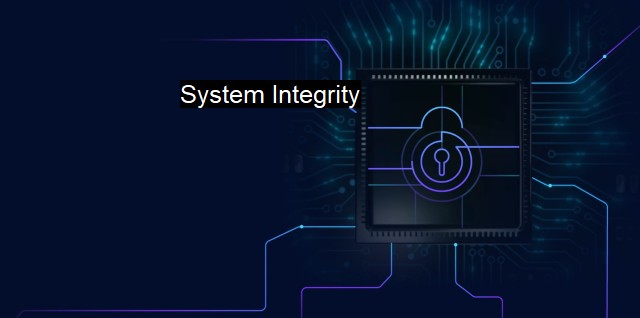What is System Integrity?
Maintaining System Integrity in Cybersecurity: Strategies to Protect Digital Data from Malware and Intruders
System Integrity, with is a crucial concept concerning the overall protection and assurance of data or information stored within any computer system. It encompasses an amalgamation of processes and technologies designed to ensure that system data remains unthreatened from imminent cyberattacks such as viruses, spyware, and malware among others.Two binding principles govern overall system integrity, which are accuracy and consistency. In a system with integrity, the data should be accurate, consistent, and reliable, regardless of the operations involved. the real-time objective is to operate and administer the system so as to minimize any accidental input errors or malicious attacks that may compromise information accuracy.
We can consider system integrity as a broader umbrella incorporating both process and user integrity. Process integrity ensures that the necessary steps to execute a task are documented, and algorithms follow the standard route. Process integrity becomes crucial in cybersecurity as an offending agent may exploit a loophole and maximize it to create disruptions in non-compliant lines. User integrity, on the other hand, is demonstrated by responsible behavior by the stakeholders in handling the data. Employing solid security practices like strong passwords, regular software updates, and avoiding suspicious emails contribute towards user integrity.
It is understood, thus, that a substantial portion of data breaches can be attributed to internal users who manage to sidestep or tamper with written and enforced policies and practices. Such damaging actions are usually accompanied by a significant compromise in system integrity.
System integrity is imperative in not just detecting the issues but effectively resolving them. It ensures that once a system is threatened, appropriate measures are enabled to reinstate the system to its original, uninfected state. Antivirus firewall integrity is a concept essentially based on this. The firewall can either be a hardware device or a software application; regardless of its form, it keeps any deceiving offensive agents from intruding into the system.
System integrity also actively partakes in the detection of operational anomalies in a system. Irregularities might be flashing telltale signs of an attempted breach or trouble. A system with integrity would notify the discrepancy and aim to rectify it promptly before the attacker exploits the weakness. Business intelligence, spam filters, and other classifiers often utilize such active learning techniques to contend with virus attacks and spam activities.
Speaking of antivirus tools, they proactively maintain a predefined level of system integrity. They tirelessly work in identifying, quarantining, and eradicating viruses and malware intrusions that might corrupt data or system functioning. Certified antivirus platforms indulge in routine checks and automatic updates to ward off any burgeoning potential threats.
It is important to note that system integrity goes beyond the purpose of thieving and destructive digital attacks. Cybersecurity strategies fundamentally enshrining the principles of system integrity can ensure control over the availability, confidentiality, and credibility of a system.
To broaden the horizon, system integrity also embraces system audits, which warn of any potential threat to a system's integrity. Via the audits, cybersecurity measures might be adjusted or corrected, thereby confirming improved system health and performance in the long run. System backups also stand pivotal in maintaining system integrity in the onset of malware, ransomware attacks or even natural disasters, providing an ultimate line of defense.
Underscoring the principles of system integrity, we gain a clear grasp on what it truly means to secure an information system. Predictably, businesses and organizations have pivoted to tight cybersecurity controls and strategies, ensuring personal and client data remain safely insulated. With an acute understanding of system integrity and the requisite safe practices, we can assure the robust protection and thus longevity of our virtual identities.

System Integrity FAQs
What is system integrity in the context of cybersecurity?
System integrity refers to the ability of a computer system to maintain its intended state and function as intended. In cybersecurity, system integrity means ensuring that the system is secure, protected from threats, and free from unauthorized modifications.How can antivirus software help maintain system integrity?
Antivirus software can help maintain system integrity by detecting and removing malware and other threats that can compromise the security of a system. It can also prevent unauthorized changes to the system through features such as real-time monitoring, file protection, and system scans.What are some common threats to system integrity?
Some common threats to system integrity include viruses, worms, Trojans, spyware, adware, and ransomware. These types of malware can infect a system and cause damage, steal sensitive information, or allow unauthorized access to the system. Other threats to system integrity include physical theft, unauthorized access, and human error.What are some best practices for maintaining system integrity?
Some best practices for maintaining system integrity include using antivirus software, keeping software up-to-date with the latest patches and updates, using strong passwords and authentication methods, backing up data regularly, restricting access to sensitive information, and providing cybersecurity training to employees. It is also essential to implement security policies and procedures and to conduct regular security assessments to identify vulnerabilities and risks.| | A | | | B | | | C | | | D | | | E | | | F | | | G | | | H | | | I | | | J | | | K | | | L | | | M | |
| | N | | | O | | | P | | | Q | | | R | | | S | | | T | | | U | | | V | | | W | | | X | | | Y | | | Z | |
| | 1 | | | 2 | | | 3 | | | 4 | | | 7 | | | 8 | | |||||||